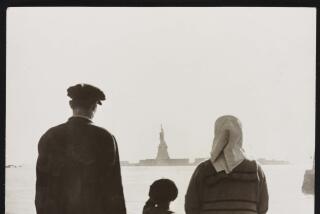Tuesday night at the Hammer: ‘The Torture Report’
- Share via
It’s been almost three years since the American Civil Liberties Union launched TheTortureReport.org, an “investigation into rendition, detention and interrogation under the Bush Administration,” drawn from 130,000 pages of documents released after a series of Freedom of Information Act lawsuits.
TheTortureReport.org is both eye-opening and overwhelming; a response to (and analysis of) prisoner abuses during the war on terror, compiled and written, for the most part, by Larry Siems, director of the Freedom to Write and International Programs at PEN American Center in New York.
On Tuesday night, Siems will be at the Hammer Museum for a PEN Center USA-sponsored event about the project with Jameel Jaffer of the ACLU; retired Air Force Col. Morris Davis, former chief prosecutor of the Guantanamo military commissions; and Avram Ludwig, producer of “Reckoning with Torture,” a Web-based documentary project in which people submit clips of themselves reading from the torture documents; these are then intercut with related sequences featuring actors, writers and former investigators doing the same.
The point is to redeem the stain of torture by bringing it into the open. And yet, Siems acknowledges in “The Torture Report: What the Documents Say About America’s Post-9/11 Torture Program,” a book drawn from the documents: “Much of that incredible trove remains untapped.” To make the project manageable, he focused on three stories — involving “CIA black sites, Guantanamo, and the torture chambers of third countries” — that, in his view, “most illuminated the workings … of the torture program.”
There are those — the Obama administration among them — who see all this as ancient history, the kind we’d do better to forget. And yet, how do we forget when, as Siems writes: the “most senior members of the Bush Administration, up to and including the President, broke international and domestic laws banning torture and cruel, inhuman, and degrading treatment. Worse, they had subordinates in the military and in civilian intelligence services break these laws for them.”
For a lot of people, such a statement can’t help but seem divisive, like much contemporary political discourse. Let me suggest, however, a broader frame of reference: What Siems is talking about is not partisan politics but national identity, the kind of country we aspire to be.
In 1968, on the night Martin Luther King, Jr. was assassinated, Robert Kennedy made a similar point in a speech to a largely African American audience in Indianapolis. “In this difficult day,” he declared, “in this difficult time for the United States, it’s perhaps well to ask what kind of a nation we are, and what direction we want to move in.”
The choice, Kennedy went on, was between polarization and the more difficult effort to “replace that violence, that stain of bloodshed that has spread across our land, with an effort to understand, compassion, and love.”
Forty-four years later, we have gone so far down the road Kennedy warned against that it is hard, at times, to imagine a passage back. Yet perhaps it starts by looking at the documentary record, and asking, as Siems writes, “how we answer to one another when we do wrong.”
More to Read
Sign up for our Book Club newsletter
Get the latest news, events and more from the Los Angeles Times Book Club, and help us get L.A. reading and talking.
You may occasionally receive promotional content from the Los Angeles Times.










